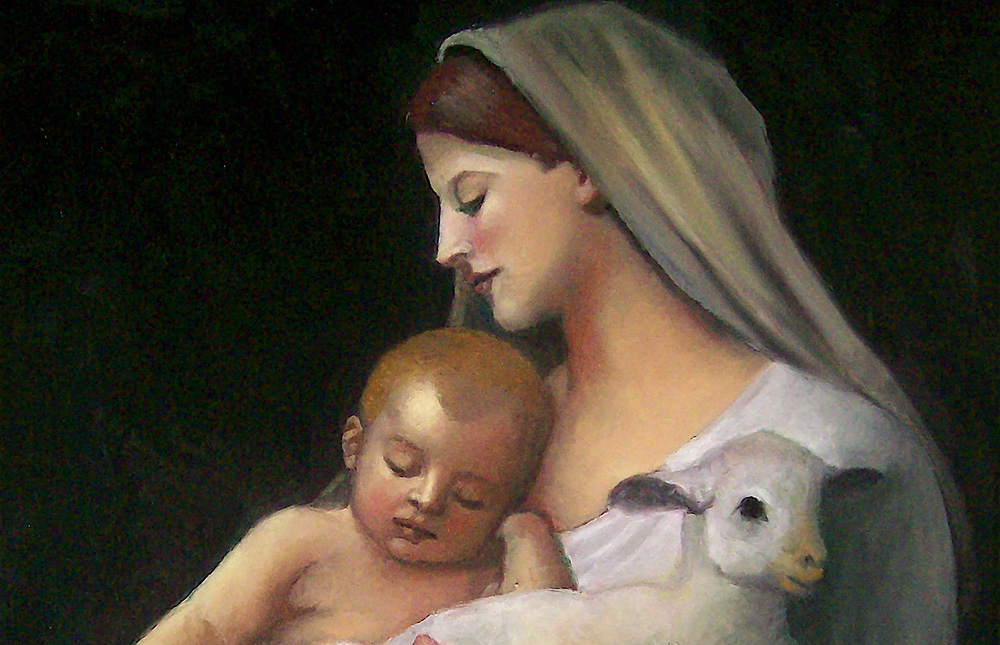Is it legitimate to call Mary the “Mother of God”? Some Christians reject the title, saying it implies that God himself somehow has His origin in Mary. How could the Creator of all things, who depends on no one else for His existence, possibly have a “mother”?
To understand why Christians have called Our Lady by this title since ancient times, we need to take a look at the controversy that arose when prayers addressed to her in this way first became popular 16 centuries ago.
Christ Is God and Man
From the very beginning of the Church, at the heart of the faith she has proclaimed lies the insistence that her founder, Jesus Christ of Nazareth, is both God and Man. Jesus claimed for himself the very name of God revealed to Moses, “I AM” (Jn 8:58), and He assumed divine prerogatives such as the forgiveness of sin (see Lk 5:18-26).
The apostles testified to this reality. St. Thomas, for example, having known Jesus in His humanity, affirmed His divinity as well when he said to Him after His resurrection, “My Lord and my God!” (Jn 20:28).
St. John wrote in his Gospel that Jesus was “the Word” who “became flesh and made his dwelling among us,” and that this “Word was God” (Jn 1:1,14). St. Paul taught that in Christ “dwells the whole fullness of the deity bodily” (Col 2:9).
When early Christians pondered these and other declarations of the apostolic witness, they wondered: How exactly was Christ both human and divine?
Was He, as some claimed, simply God and only appeared to be human? Was He, as others speculated, a human to whom God attached himself in a special way, dwelling inside him? Or was He, as still others imagined, a kind of hybrid, partly human and partly divine?
Ultimately, in the light of Scripture and Tradition, and led by the Holy Spirit, the Church concluded that none of the above answers is correct. The Council of Ephesus, an ecumenical Church council held in the year 431, resolved the issue. (For more on ecumenical councils, see “What Are Ecumenical Councils?” Page 30.)
That council was provoked by a controversy over one particular question: Can we legitimately call Mary “the Mother of God”?
One prominent archbishop, named Nestorius, began to preach against the use of the Marian title Theotokos, which means literally “God-bearer,” or “the one who bore God.” Christ was two persons, he claimed — one human, one divine — joined together. Though Mary was the bearer (or mother) of the human person in Christ, she was not the mother of the divine Person (God the Son). So she could not rightly be called the Mother of God.
Two Natures in One Person
After examining this teaching, the Church pronounced Nestorius mistaken. Christ was not a combination of two persons, one human and one divine. That would be close to saying that He was simply a man to whom God was joined in a uniquely intimate way — a man specially indwelled by God, like one of the Old Testament prophets.
Instead, the Church declared, Christ is only one divine Person — the Second Person of the Trinity. This single Person took our human nature and joined it to His own divine nature, so that He possesses two natures (see Jn 1:1-3,14).
But those natures don’t constitute two different persons. Christ is not a committee. The two natures belong to one and the same Person, the divine Son of God. And those two natures, though not to be confused, cannot be separated.
In this light, the Church concluded not only that it is correct to call Mary the Mother of God, but that it is important to do so. Mary conceived and bore in her womb the one Person, Jesus Christ, who is God in the flesh. If we deny that she is the Mother of God, then we are denying that her Son, Christ, is God, come down from heaven.
For this reason, Catholics today follow the ancients in calling Mary Theotokos, “the God-bearer,” the Mother of God. The apostolic witness is clear: As St. Paul put it succinctly, “God sent his Son, born of a woman” (Gal 4:4).

